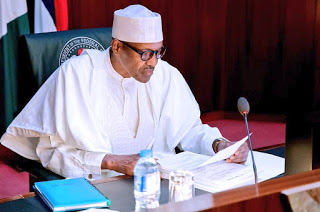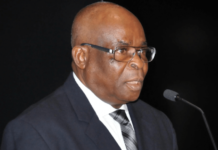Nigeria plans to increase its budget to a record 8.6
trillion naira ($27.34 billion) in 2018, up 15.5 percent from this year
to stimulate growth, according to a draft budget document seen by
Reuters on Thursday.
trillion naira ($27.34 billion) in 2018, up 15.5 percent from this year
to stimulate growth, according to a draft budget document seen by
Reuters on Thursday.
The country, which has Africa’s biggest
economy, emerged from its first recession in 25 years in the second
quarter and has trimmed its forecast for 2017 growth to 1.5 percent from
2.19 percent, according to the document.
The
draft figures must be approved by the Senate before a budget is
submitted. The document was prepared by the budget ministry, dated in
August and titled 2018-2020 Medium Term Expenditure Framework and Fiscal
Strategy Paper.
draft figures must be approved by the Senate before a budget is
submitted. The document was prepared by the budget ministry, dated in
August and titled 2018-2020 Medium Term Expenditure Framework and Fiscal
Strategy Paper.
Nigeria has increased its
budget each year under President Muhammadu Buhari, who took office in
May 2015, in a bid to spend its way out of a downturn caused by low oil
prices but struggles to fund it completely or increase revenues.
budget each year under President Muhammadu Buhari, who took office in
May 2015, in a bid to spend its way out of a downturn caused by low oil
prices but struggles to fund it completely or increase revenues.
(adsbygoogle = window.adsbygoogle || []).push({});
“Aggregate
expenditure is estimated at 8.60 trillion naira. This provision exceeds
2017 aggregate expenditure estimate of 7.44 trillion by 15.5 percent,”
the document said.
expenditure is estimated at 8.60 trillion naira. This provision exceeds
2017 aggregate expenditure estimate of 7.44 trillion by 15.5 percent,”
the document said.
“Of the total expenditure
estimates, up to 2.60 trillion naira is targeted at capital expenditure,
representing 30 percent of the budget,” it went on.
estimates, up to 2.60 trillion naira is targeted at capital expenditure,
representing 30 percent of the budget,” it went on.
Nigeria’s
government has increased spending on infrastructure in the last few
years in an attempt to diversify the OPEC member’s oil-dependent
economy.
government has increased spending on infrastructure in the last few
years in an attempt to diversify the OPEC member’s oil-dependent
economy.
The document said fiscal policy will
be geared towards accelerating the pace of growth, intensifying economic
diversification and social inclusion. It said the economy needs higher
private investment levels to achieve broad-based growth.
be geared towards accelerating the pace of growth, intensifying economic
diversification and social inclusion. It said the economy needs higher
private investment levels to achieve broad-based growth.
“Although
the amount of spending increases, yet again, in Nigerian naira terms –
it is by less than the rate of inflation,” said Razia Khan, chief
economist Africa at Standard Chartered Bank. Annual inflation in Nigeria
was at 15.98 percent in September.
the amount of spending increases, yet again, in Nigerian naira terms –
it is by less than the rate of inflation,” said Razia Khan, chief
economist Africa at Standard Chartered Bank. Annual inflation in Nigeria
was at 15.98 percent in September.
“What
matters more, however, is Nigeria’s poor rate of budget execution,
especially on the capital expenditure budget,” she added.
matters more, however, is Nigeria’s poor rate of budget execution,
especially on the capital expenditure budget,” she added.
(adsbygoogle = window.adsbygoogle || []).push({});
The
government expected to boost oil production, which makes up about
two-thirds of government revenues, to 2.3 million barrels per day (mbpd)
in 2018. The document said production was at 1.9 mbpd for 2017, as of
July, against an estimated 2.2 mbpd.
government expected to boost oil production, which makes up about
two-thirds of government revenues, to 2.3 million barrels per day (mbpd)
in 2018. The document said production was at 1.9 mbpd for 2017, as of
July, against an estimated 2.2 mbpd.
The
document said government borrowing has significantly increased in recent
years as it tries to fund its budget deficit and debt to revenue levels
posed a substantial risk.
document said government borrowing has significantly increased in recent
years as it tries to fund its budget deficit and debt to revenue levels
posed a substantial risk.
Nigeria has a total
debt of 19.16 trillion naira ($62.9 billion) as of the first quarter
2017, the document said, adding that the government would favour foreign
financing over domestic borrowing to lower interest rates at home.
debt of 19.16 trillion naira ($62.9 billion) as of the first quarter
2017, the document said, adding that the government would favour foreign
financing over domestic borrowing to lower interest rates at home.
Earlier
this month, Buhari sought approval from lawmakers for $5.5 billion of
foreign borrowing which would include $2.5 billion for plugging part of
this year’s deficit.
this month, Buhari sought approval from lawmakers for $5.5 billion of
foreign borrowing which would include $2.5 billion for plugging part of
this year’s deficit.
The document also said the
government was considering plans to raise taxes on luxury goods to 15
percent by 2018 from 5 percent.
government was considering plans to raise taxes on luxury goods to 15
percent by 2018 from 5 percent.
“This should be complemented by measures to broaden the tax base,” said Khan.
Reuters












